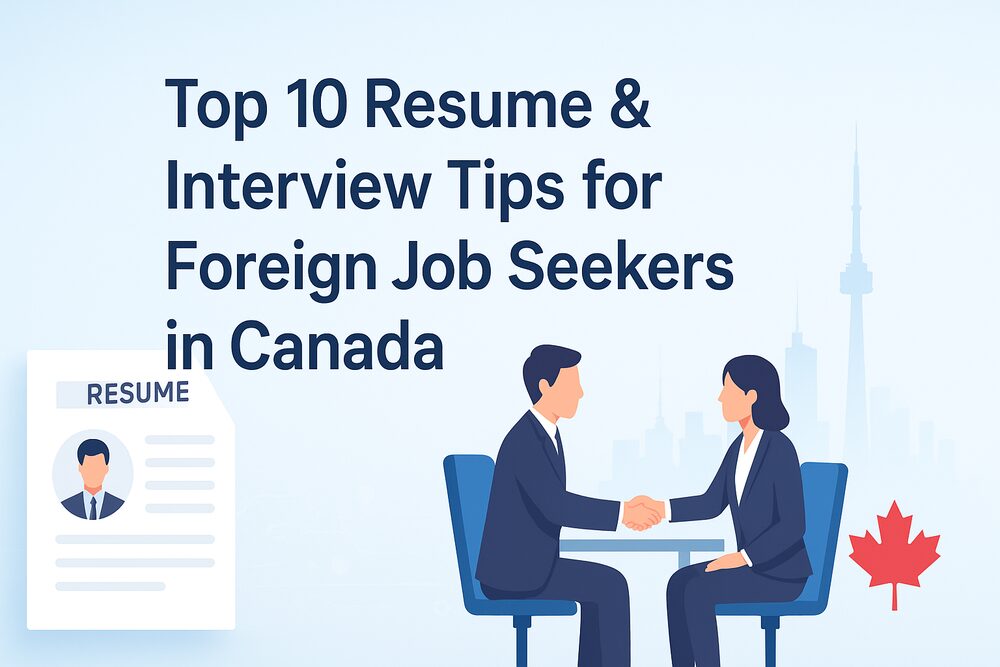Have you ever wondered why some foreign job seekers succeed quickly in Canada while others struggle for months? Many opportunities are offered, but not everyone is noticed. The resume is often filtered, and interviews are sometimes misunderstood.
Small mistakes are made, and chances are lost. Preparation is always required, and every detail is important. What are the top resume and interview tips to follow in Canada? Read this article written by a leading consultancy offers Canada work permit from Qatar
Resumes Should Always Be Kept Short and Clear
Resumes are often reviewed quickly by busy employers in Canada. Important information should be highlighted and irrelevant details are removed. A clear format is preferred to make reading easier for recruiters.
Each section is organized so key skills are noticed immediately. Unnecessary words and long sentences are avoided to keep focus. Bullet points are often used to make achievements more visible.
The length of the resume is usually limited to two pages. A simple layout is recommended to leave a professional impression.
Canadian Style Resumes Are Preferred by Most Employers
Canadian style resumes are usually structured differently from other countries. A chronological format is often chosen to show work history clearly. Important skills are emphasized and achievements are highlighted in separate sections. Personal details like age or photo are generally not included. Job titles are described so responsibilities are easily understood by employers.
Key phrases are often added to match Canadian job standards. The resume is reviewed carefully to ensure it looks professional.
Work Experience Must Be Described Using Simple Action Words
Work experience is often reviewed quickly by Canadian employers. Strong action words are used to show achievements clearly. Tasks and responsibilities are described so results are understood easily. Passive phrases are avoided to make sentences more direct and professional. Each accomplishment is highlighted so it stands out on the resume. Quantifiable results are often included to show real impact.
Skills are demonstrated through examples and key contributions are mentioned. Simple and clear language is preferred to avoid confusion.
References Should Be Added Only When They Are Requested
References are usually checked by employers after interviews are completed. Contact details are provided only if they are specifically asked. Previous managers or colleagues are often chosen to give reliable information. Careful permission is always obtained before including anyone’s name and number. Reference letters can be attached if requested by the company.
Information is presented clearly to make verification easier for recruiters. Unnecessary references are avoided to keep the resume focused and professional.
Cover Letters Are Expected for Many Job Applications
Cover letters are often requested by Canadian employers with resumes. A personalized letter is written to show interest in the position. Key skills and experiences are highlighted to match the job requirements. Professional language is always used to make a positive impression.
Achievements are briefly explained so employers understand capabilities clearly. The letter is kept concise to maintain the reader’s attention. Format and structure are carefully followed for clarity and professionalism.
Local Keywords Are Used by Recruiters in Searches
Resumes are often scanned by software before they are read. Important local keywords are included to match job descriptions accurately. Job titles and skills are aligned with Canadian standards carefully. Industry-specific terms are used so applications are noticed quickly.
Each keyword is placed naturally within the resume content. Missing keywords can cause the application to be rejected early. Skills and qualifications are highlighted using terms preferred by recruiters.
Practice Interviews Must Be Done Before the Actual Meeting
Interviews are often prepared carefully to increase confidence and performance. Common questions are practiced so answers are delivered clearly and calmly. Mock interviews are conducted by friends or career counselors for feedback. Body language is observed and corrected during practice sessions.
Time is managed to ensure answers are concise and relevant. Professional etiquette is always followed during rehearsals to build habits. Difficult questions are anticipated and strategies are prepared in advance.
Eye Contact Should Be Maintained to Show Confidence
Eye contact is often noticed by interviewers during meetings. Confidence is conveyed when steady eye contact is maintained throughout answers. Nervous habits are reduced when focus is kept on the interviewer. Positive impressions are created by using natural and polite eye contact. Questions are understood better when attention is clearly shown through eyes.
Clear Answers Are Expected Instead of Long Explanations
Answers are usually evaluated carefully by Canadian interviewers for clarity. Long explanations are avoided to keep communication simple and effective. Each response is structured so key points are easily understood. Questions are listened to carefully before answers are given.
Examples are included briefly to support the main idea. Confusing or off-topic information is removed to maintain focus. Short and direct sentences are preferred during interviews for better impression. Preparation is done to practice giving concise and clear answers.
Thank You Emails Should Be Sent After Interviews
Thank you, emails are usually appreciated by Canadian employers, after interviews. Gratitude is expressed for the opportunity to discuss the position. Key points from PNP program for Canada are briefly mentioned to show interest. Professional tone is maintained throughout the email to leave a good impression.
Mistakes or informal language are avoided to keep it polite and correct. Emails are sent within twenty-four hours to ensure timely communication.








Leave a Reply